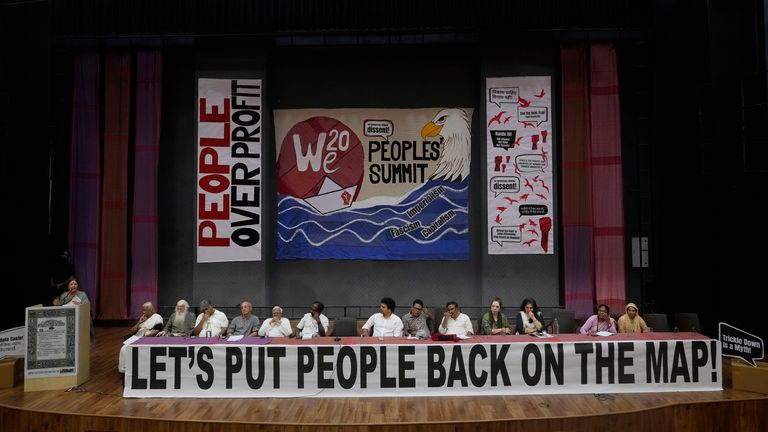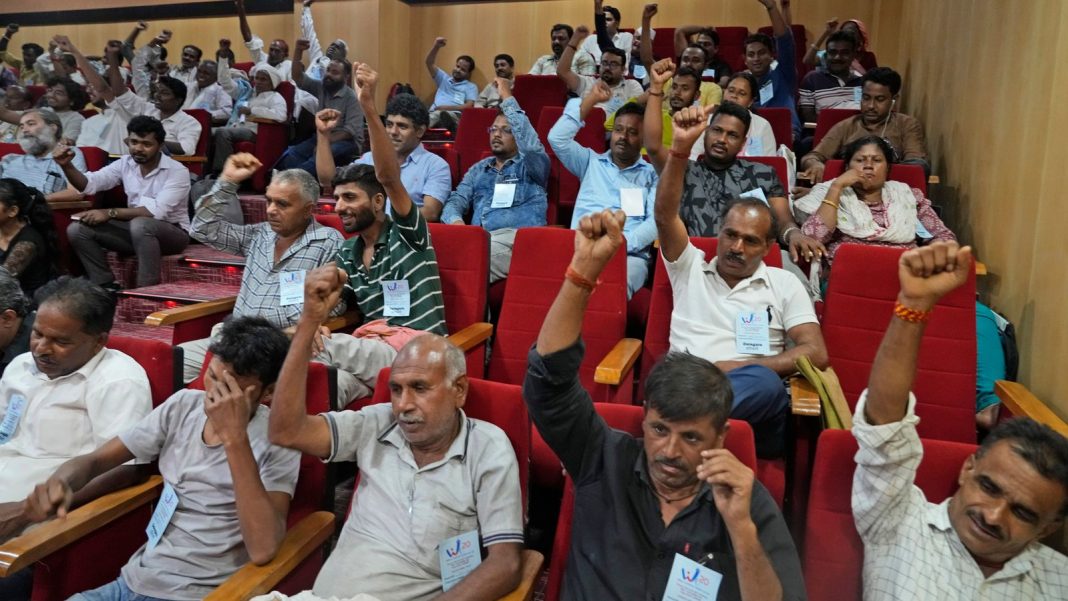Indian police have intervened to stop a conference where the country’s prime minister Narendra Modi was accused of using the upcoming G20 leaders’ summit to boost his party’s chances in next year’s general election.
A spokesperson for the “We20” conference said police sent a letter calling for the two-day gathering of hundreds of people to end as it did not have the proper permission.
Mr Modi and his Bharatiya Janata Party (BJP) were criticised by some speakers at the event for using the upcoming G20 gathering of world leaders to try to bolster their chances in the 2024 general election.
He is set to welcome the leaders of the G20 nations – including the UK’s Rishi Sunak – to India for the leaders’ summit in September.
The UK’s health secretary, Steve Barclay, was in India over the weekend for a meeting of G20 health ministers.
Almost 400 people – including activists, academics and politicians – gathered for the We20 conference, with issues like food security, climate change, labour rights, natural resources and rising inequality all being discussed.
We20 spokesperson Kavita Kabeer said the gathering was told it did not have the proper permission to take place in a high-security zone.
“We are shocked that we need to have permission to practice democracy,” a statement by the organisers said.
It added that police tried to stop attendees from entering the venue for the gathering.
Delhi Police declined to comment on the We20 summit, according to the AP news agency.
But local media reported that Sanjay Sain, a police officer, said: “They had erected tents outside the building. And there was a considerable gathering of people in an area where Section 144 [prohibiting gatherings of four or more people] had been imposed.”
Mr Modi’s critics have claimed India’s democratic principles are being put under threat during his leadership.
With a population of more than 1.4bn, the nation is the world’s largest democracy.
The government has denied democracy is threatened, instead stating that it is robust and thriving.
Activist Dayamani Barla speaking at the We20 gathering. Pic: AP

The We20 was being held before the G20. Pic: AP
Read more:
Protests rock Indian parliament following ethnic violence
Indian MP sentenced for defaming Narendra Modi
Sunak condemns violence at Indian High Commission
Last month, protests gripped the Indian parliament following unrest in the northeastern state of Manipur.
At least 130 people died in the violence, with thousands injured since it began in May after women from the Kuki-Zomi tribe were filmed being paraded naked and groped.
While Mr Modi condemned the initial incident, he did not speak against the clashes between the politically dominant Meitei Hindu community of the valley and the Christian Kuki-Zomi tribal groups who live in the hills.
This content is provided by Spreaker, which may be using cookies and other technologies.
To show you this content, we need your permission to use cookies.
You can use the buttons below to amend your preferences to enable Spreaker cookies or to allow those cookies just once.
You can change your settings at any time via the Privacy Options.
Unfortunately we have been unable to verify if you have consented to Spreaker cookies.
To view this content you can use the button below to allow Spreaker cookies for this session only.
Click to subscribe to the Sky News Daily wherever you get your podcasts
In March, an opposition leader – Rahul Gandhi – was sentenced to two years in prison for defaming Mr Modi in 2019.
While back in January, a BBC documentary about Mr Modi’s role in the Gujarat riots in 2002 was blocked. Mr Modi was the chief minister of the state when the unrest left 1,000 people dead.







